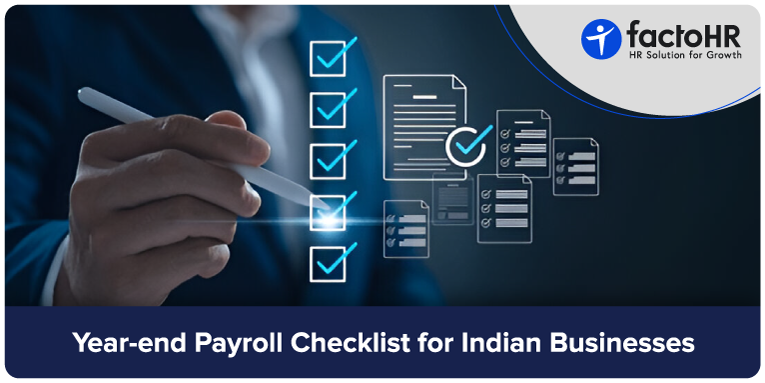Payroll Year-End Checklists for Indian Businesses

Table of Contents
The payroll year-end is crucial for every Indian business. It keeps companies compliant and avoids unwanted trouble. For HR teams, it’s about trust, accuracy, and smooth financial year closing. Having a clear year-end payroll checklist saves time and prevents errors. It helps you pay salaries, deduct taxes, and track benefits without missing deadlines.
It also keeps your reports ready for audits. The end-to-end payroll process involves reconciliations, tax filings, and the generation of reports. Following a checklist reduces last-minute stress and ensures a smooth year-end close. It also prepares HR teams for audits and policy updates.
Understanding the Indian payroll process helps answer questions like “When to run payroll year-end?” or “How to accrue payroll at year-end?” Clarity on these helps maintain smooth operations. By taking proactive steps, HR professionals can complete the payroll year-end efficiently and effectively. It protects the business from penalties and ensures a strong start to the new year.

What is a Payroll Year-End, and why is It Important?
Payroll year-end signals the wrap-up of a company’s yearly payroll cycle. In India, the financial year aligns with the calendar year, concluding on March 31. At this time, HR teams finalize salary records, verify tax deductions, and complete all necessary legal payments. Using a clear payroll year-end checklist helps ensure that nothing is missed and every rule is followed on time.
Missing payroll year-end deadlines can lead to fines or legal issues. It also impacts employee records, tax submissions, and the accuracy of the company’s financial statements. Completing payroll tasks on time helps HR start the new financial year with updated records, correct reports, and no pending work. It supports an error-free Indian payroll process and smooth year-end reconciliation.
Timely payroll processing by HR teams is crucial for safeguarding both employees and the organization. Regularly conducting a thorough payroll cycle audit ensures accuracy, compliance, and peace of mind.
Compliance with Tax Laws & Statutory Filings
During the payroll year-end, HR must complete all tax and legal filings. It includes TDS, PF, ESI, and professional tax submissions. Filing delays can lead to penalties or employee disputes. A detailed payroll year-end checklist helps HR track each statutory deadline.
It ensures proper calculation and submission of all government dues. Understanding the payroll cycle helps HR align timelines with legal requirements. This step protects the company and maintains employee trust.
Accurate Employee Payouts and Benefits
Accurate payroll payouts at year-end help build trust with employees. HR should verify salaries, bonuses, and benefits before issuing the final pay. These include tax deductions, leave encashments, and bonuses for the running year.
A simple checklist helps avoid payment errors or mistakes. It also keeps records ready for audit and reporting needs. HR teams should assess their payroll calculation processes to make year-end tasks easier and more accurate. A transparent process supports smooth reporting and a timely financial year closing.
Avoiding Penalties and Financial Risks
Missing a payroll year-end deadline can lead to severe financial penalties. Delayed filings may result in fines, audits, or harm to the company’s reputation. HR teams should proactively plan ahead by utilizing updated tools and setting reminders for each deadline. Using payroll automation reduces manual errors and ensures compliance with regulations on time.
A well-executed payroll year-end helps reduce financial risk for your business. It ensures data accuracy and ensures all filings are completed on time. It also helps meet Indian payroll rules and laws. A clear checklist makes the process easy and less stressful for HR.

Year-End Payroll Checklist to Follow
A payroll year-end checklist helps HR ensure the timely, accurate processing of salaries, taxes, and other payments. It supports compliance and smooth financial year closing for Indian companies.
Reconcile Payroll Data and Reports
HR must thoroughly review payroll reports at the end of the year. They must verify salaries, bonuses, tax deductions, and monthly payroll details to ensure accuracy. Reliable payroll software ensures accurate calculations and maintains employee records.
Reconciliation ensures that reports are accurate before the end of the financial year. This process builds trust and helps with audits. HR teams manage payroll better with a clear data review. It streamlines the entire end-to-end payroll process.
Verify Employee Information and Statutory Deductions
During the payroll year-end, review all employee details carefully. Confirm names, bank accounts, and PAN numbers are correct. Accurate data helps avoid payroll mistakes and delays.
Check statutory deductions, such as Provident Fund and Professional Tax. Confirm they meet government regulations and adhere to the specified limits. This step helps HR maintain payroll compliance. It also aids in smooth financial year closing.
Ensure Accuracy in (PF), (ESI), and (PT)
Ensuring accuracy in PF, ESI, and PT is crucial at the end of the payroll year. HR teams must verify that all statutory deductions meet the required limits. Proper tracking avoids miscalculations that may impact employee benefits. It helps support error-free financial year closing.
During the financial year-end, HR must ensure the accuracy of the end-to-end payroll process. Routine checks at this stage help avoid errors in deductions. HR teams should compare payroll details with past data for clarity. This step also lowers risks and helps during audits.
Process Pending Payments (Bonus, Arrears, etc.)
At the end of the payroll year, reviewing all pending payouts is essential for HR teams. It includes bonuses, arrears, and any delayed pay, like held salaries or missed incentives. Processing these amounts promptly fosters trust and demonstrates payroll efficiency. Accurate disbursement helps ensure adherence to company policies and legal requirements.
These payments should be reflected in the final reports before the year-end closing. Ensure that all records are carefully checked and updated. Automation tools help simplify payroll and set payout schedules. It keeps the payroll process smooth and avoids last-minute mistakes.
Submit Form 24Q and TDS Filings
Timely submission of Form 24Q is crucial for accurate TDS reporting. It covers all salary-related TDS made in the financial year. Proper TDS filings enable businesses to comply with Indian tax laws and avoid penalties.
HR teams should check deductions before sending them to the tax office. It helps finish the financial year smoothly and without problems. Using payroll software makes filing easier and faster.
Prepare Form 16 for Employees
One of the essential steps in the payroll year-end checklist is preparing Form 16 for all employees. Form 16 is a record of employees’ total earnings and TDS deductions for the current financial year. The role of HR here is to verify all salary and tax details before generating this form to ensure accuracy and completeness.
Timely preparation of Form 16 helps meet statutory requirements and aids in smooth financial year closing. Using payroll software can simplify this process and reduce errors. It fosters employee trust and effectively supports the Indian payroll process.
Communicate Year-End Changes and Updates to Employees
Sharing year-end updates ensures employees stay informed. HR should communicate key changes related to the payroll year-end process and any new compliance regulations.
Sending updates on time helps reduce confusion and builds trust. Sharing information through emails or company portals ensures that it reaches all staff. It helps finish the financial year well. It keeps the team informed.
Plan for the Financial Year Closing
Responsible planning for the financial year-end closing is considered one of the key roles of any HR manager in India. It requires going through the year-end checklist, verifying deductions, and ensuring that all the relevant compliances are met. Financial year-end closing also entails that HR teams need to complete all the payroll tasks on time, accurately, and without errors.
A clear plan for closing the financial year avoids last-minute stress and errors. It helps create accurate reports and comply with payroll laws. Good planning also ensures a smooth and organized payroll process.

Conclusion
A payroll year-end checklist is crucial for Indian businesses to stay compliant. It helps HR teams manage payments, reports, and tax filings on time. With a clear checklist, payroll tasks become smooth and less stressful. It also helps avoid errors during the financial year’s closing.
Using the right tools early helps HR stay in complete control. It brings peace of mind and fosters trust throughout the team. Early planning also lowers the risk of missing key deadlines. This ensures a simple and error-free year-end process for every business.
To ease your payroll year-end management, consider using factoHR’s payroll solutions. They are designed to help HR professionals meet compliance and deadlines effortlessly. To get started, schedule a demo today to experience how factoHR can transform your payroll year-end process.
Grow your business with factoHR today
Focus on the significant decision-making tasks, transfer all your common repetitive HR tasks to factoHR and see the things falling into their place.

© 2026 Copyright factoHR


